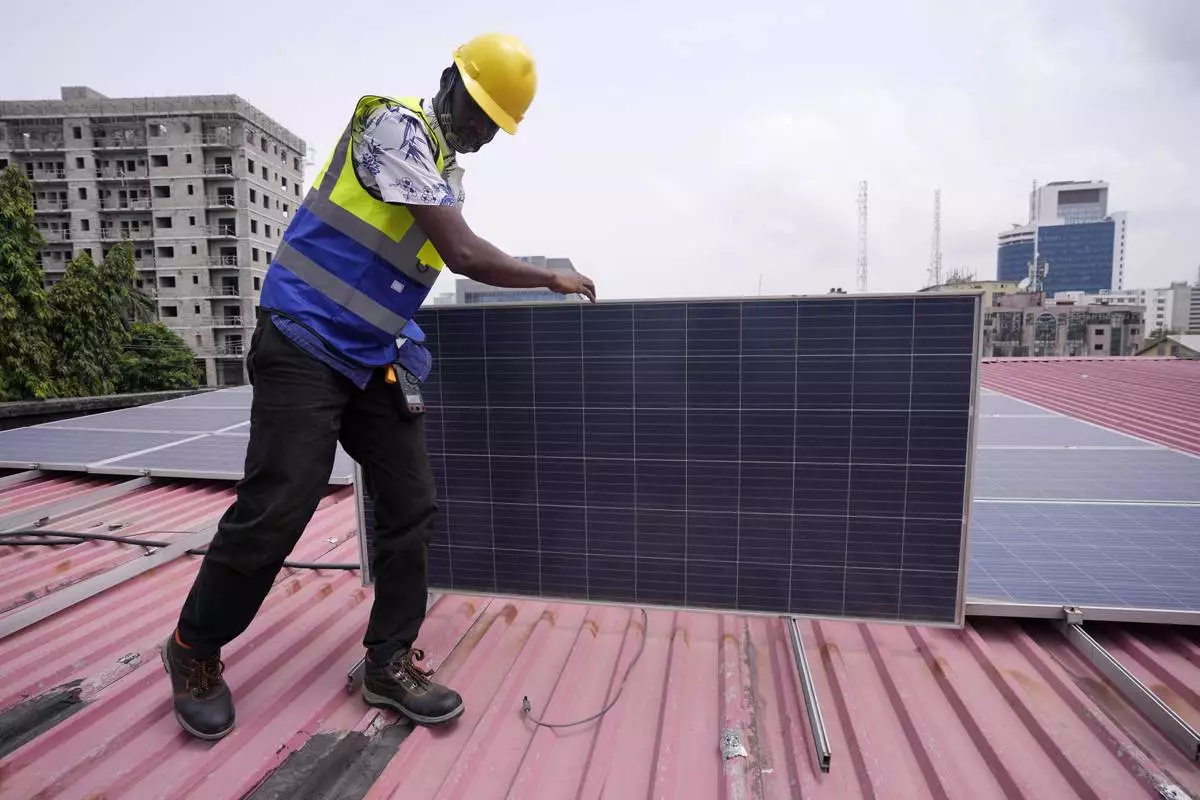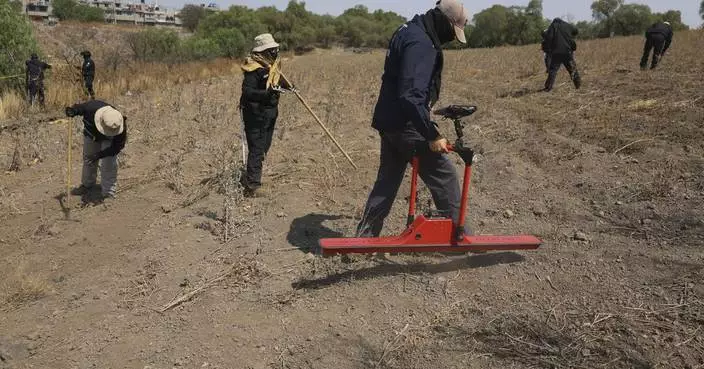Track and field is set to become the first sport to introduce prize money at the Olympics, with World Athletics saying Wednesday it would pay $50,000 to gold medalists in Paris.
The move is a symbolic break with the amateur past of the Olympics in one of the games' most-watched events.
The governing body of athletics said it was setting aside $2.4 million to pay the gold medalists across the 48 men's, women's and mixed events on the track and field program for this year's Paris Olympics. Relay teams will split the $50,000 between their members. Payments for silver and bronze medalists are planned to start from the 2028 Olympics in Los Angeles.
World Athletics President Sebastian Coe told reporters that the move is meant "to recognize that the revenue share that we receive is in large part because our athletes are the stars of the show.”
The prize money will come out of the share of Olympic revenue that that the IOC distributes to World Athletics.
However, the move could upset the balance of power in the Olympic movement ahead of the Paris Games. Coe said World Athletics only gave the International Olympic Committee “a heads-up” of its intentions on Wednesday morning, shortly before it published its announcement.
In response, the IOC said it was up to each sport's governing body to decide how to spend its share of Olympic revenue.
“The IOC redistributes 90% of all its income, in particular to the National Olympic Committees (NOCs) and International Federations (IFs),” the IOC said. “This means that, every day, the equivalent of $4.2 million goes to help athletes and sports organizations at all levels around the world. It is up to each IF and NOC to determine how to best serve their athletes and the global development of their sport.”
The modern Olympics originated as an amateur sports event and the IOC does not award prize money. However, many medalists receive payments from their countries’ governments, national sports bodies or from sponsors.
“I’m probably the last generation to have been on the 75-pence (95-cent) meal voucher and second-class rail fare, competing for my own country. So believe me, I do understand the nature of the transition we’ve been in,” Coe said.
The British runner won gold in the 1,500 meters at the 1980 and 1984 Games in an era when Olympic track was on the verge of opening up to professional athletes.
“It’s a completely different planet from when I was competing, so it's very important that this sport recognizes the change in that landscape and the added pressures on many competitors.”
The United States Olympic and Paralympic Committee awarded $37,500 to gold medalists at the last Summer Games in Tokyo in 2021. Singapore's National Olympic Council promises $1 million for Olympic gold, a feat only achieved once so far by a Singaporean competitor.
In sports like tennis and golf, the Olympic tournament is the only time in a season that many pro players compete for free, with medals on offer but no prize money. But Coe didn't want to speculate on whether other events could follow track and field’s lead.
“I’ve always made it a point not to speak on behalf of other sports,” Coe said.
The move by World Athletics could be seen as an indicator of Coe’s intentions for the Olympics as a whole if he makes a run for the IOC presidency.
“I haven’t ruled it in, and I certainly haven’t ruled it out,” Coe said last year when asked whether he would consider running for the IOC’s top post when Thomas Bach’s term ends in 2025. The IOC typically disapproves of any public campaigning for the presidency and Coe's comments drew criticism from Bach.
There's no sign yet of any other Olympic sport following track's lead. World Athletics is an outlier financially since it gets almost all its funding from its own events like the world championships. The governing bodies for many smaller sports depend on their IOC payments to survive the four-year cycle until the next Games.
World Aquatics, which oversees events like swimming, diving and water polo, told The Associated Press it considered introducing Olympic prize money in the run-up to the last Summer Olympics in Tokyo but instead opted to increase prize funds at its own competitions. Its world championships paid $20,000 per individual gold medal this year.
Olympic gold medalists in track and field will still earn less prize money than at World Athletics' own world championships. Last year's edition in Budapest paid out prize money down to eighth place with $70,000 on offer for individual gold medalists.
Athletes will have to pass “the usual anti-doping procedures” at the Olympics before they receive the new prize money, World Athletics added.
It’s uncertain how prize money would fit into the American college system, though recent changes that allow players to profit from sponsorship deals have undercut restrictions on athlete payments.
“I sincerely hope so," Coe said when asked if he expected the NCAA to allow college athletes to accept Olympic prize money. "The rules and protocols have changed, and I can’t imagine the NCAA would think that this is in any way other than helpful for the support and the ecosystem that the athletes are now operating under.”
AP sports: https://apnews.com/sports

FILE - Lamont Marcell Jacobs, of Italy poses with his gold medal following the men's 100-meters final at the 2020 Summer Olympics, Monday, Aug. 2, 2021, in Tokyo. Track and field is set to become the first sport to introduce prize money at the Olympics, with World Athletics saying Wednesday, April 10, 2024, it would pay $50,000 to gold medalists in Paris. (AP Photo/Francisco Seco, File)

FILE - A general view of National Stadium during an athletics test event for the Tokyo 2020 Olympics Games in Tokyo, on May 9, 2021. Track and field is set to become the first sport to introduce prize money at the Olympics, with World Athletics saying Wednesday, April 10, 2024, it would pay $50,000 to gold medalists in Paris. The modern Olympics originated as an amateur sports event and the IOC does not award prize money, though many medalists receive payments from their countries' governments, national sports bodies or from sponsors. The United States Olympic and Paralympic Committee awarded $37,500 for gold medalists at the last Summer Games in Tokyo in 2021. (AP Photo/Shuji Kajiyama, File)

FILE - World Athletics President Sebastian Coe listens to a journalist's question during a press conference at the conclusion of the World Athletics meeting at the Italian National Olympic Committee, headquarters, in Rome, Wednesday, Nov. 30, 2022. Track and field is set to become the first sport to introduce prize money at the Olympics, with World Athletics saying Wednesday, April 10, 2024, it would pay $50,000 to gold medalists in Paris. (AP Photo/Gregorio Borgia, File)
NAIROBI, Kenya (AP) — When Ademola Adesina founded a startup to provide solar and battery-based power subscription packages to individuals and businesses in Nigeria in 2015, it was a lot harder to raise money than it is today.
Climate tech was new in Africa, the continent was a fledgling destination for venture capital money, there were fewer funders to approach and less money was available, he said.
It took him a year of “running around and scouring” his networks to raise his first amount — just under $1 million — from VC firms and other sources. “Everything was a learning experience,” he said.
But the ecosystem has since changed, and Adesina’s Rensource Energy has raised about $30 million over the years, mostly from VC firms.
Funding for climate tech startups in Africa from the private sector is growing, with businesses raising more than $3.4 billion since 2019. But there’s still a long way to go, with the continent requiring $277 billion annually to meet its climate goals for 2030.
Experts say to unlock financing and fill this gap, African countries need to address risks like currency instability that they say reduce investor appetite, while investors need to expand their scope of interest to more climate sectors like flood protection, disaster management and heat management, and to use diverse funding methods.
Still, the investment numbers for the climate tech sector — which includes businesses in renewable energy, carbon removal, land restoration and water and waste management — are compelling: Last year, climate tech startups on the continent raised $1.04 billion, a 9% increase from the previous year and triple what they raised in 2019, according to the funding database Africa: The Big Deal. That was despite a decline in the amount of money raised by all startups in total on the continent last year.
That matters because climate tech requires experimentation, and VC firms that provide money to nascent businesses are playing an essential role by giving climate tech startups risk capital, said Adesina. “In the climate space, a lot of things are uncertain,” he said.
The money raised by climate tech startups last year was more than a third of all funds raised by startups in Africa in 2023, placing climate tech second to fintech, a more mature sector.
Venture capital is typically given to businesses with substantial risk but great long-term growth potential. Startups use it to expand into new markets and to get products and services on the market.
Venture capitalists “can take risks that other people cannot take, because our business model is designed to have failures,” said Brian Odhiambo, a Lagos-based partner at Novastar Ventures, an Africa-focused investor. “Not everything has to succeed. But some will, and those that do will succeed in a massive way.”
That was the case for Adetayo Bamiduro, co-founder of Metro Africa Xpress, which makes electric two- and three-wheelers and electric vehicle infrastructure in Nigeria and has raised just under $100 million since it was founded in 2015.
Adetayo said venture capitalists “are playing a catalytic role that is extremely essential.”
“We all know that in order to really decarbonize our economies, investments have to be made. And it’s not trivial investment,” he said.
The funds can also bridge the gap between traditional and non-traditional sectors, said Kidus Asfaw, co-founder and CEO of Kubik, a startup that turns difficult-to-recycle plastic waste into durable, low-carbon building material. His company, which operates in Kenya and Ethiopia, has raised around $4.6 million since it was launched in 2021.
He cites waste management and construction as examples of traditional sectors that can connect with startups like his.
“There’s so much innovation in these spaces that can transform them over time,” he said. “VCs are accelerating that pathway to transforming them.”
Besides venture capital, other investments by private equity firms, syndicates, venture builders, grant providers and other financial institutions are actively financing climate initiatives on the continent.
But private sector financing in general lags far behind that of public financing, which includes funds from governments, multilaterals and development finance institutions.
From 2019 to 2020, private sector financing represented only 14% of all of Africa’s climate finance, according to a report by the Climate Policy Initiative, much lower than in regions such as East Asia and Pacific at 39%, and Latin America and the Caribbean at 49%.
The low contribution in Africa is attributed to the investors putting money in areas they’re more familiar with, like renewable energy technology, with less funding coming in for more diverse initiatives, said Sandy Okoth, a capital market specialist for green finance at FSD Africa, one of the commissioners of the CPI study.
“The private sector feels this (renewable energy technology) is a more mature space,” he said. “They understand the funding models.”
Technology for adapting to climate change, on the other hand, is “more complex”, he said.
One startup working in renewable energy is the Johannesburg-based Wetility, which last year secured funding of $48 million — mostly from private equity — to expand its operations.
The startup provides solar panels for homes and businesses and a digital management system that allows users to remotely manage power usage, as it tries to solve the problems of energy access and reliability in southern Africa.
“Private sector financing in African climate is still rather low,” said founder and CEO Vincent Maposa. “But there’s visible growth. And I believe that over the next decade or so, you’ll start to see those shifts.”
Investors are also starting to understand the economic benefits of adapting to climate change and solutions as they have returns on investment, said Hetal Patel, Nairobi-based director of investments at Mercy Corps Ventures, an early-stage VC fund focused on startups building solutions for climate adaptation and financial resilience.
“We’re starting to build a very strong business case for adaptation investors and make sure that private capital flows start coming in,” he said.
Maëlis Carraro, managing partner at Catalyst Fund, a Nairobi-based VC fund and accelerator that funds climate adaptation solutions, urged more diverse funding, such as that which blends private and public sector funding. The role of public financing, she said, should be to de-risk the private sector and attract more private sector capital into financing climate initiatives.
“We’re not gonna go far enough with just the public funding,” she said. “We need the private sector and the public sector to work together to unlock more financing. And in particular looking beyond just a few industries where the innovation is writ large.”
__
The Associated Press’ climate and environmental coverage receives financial support from multiple private foundations. AP is solely responsible for all content. Find AP’s standards for working with philanthropies, a list of supporters and funded coverage areas at AP.org.

Oladapo Adekunle, an engineer with Rensource Energy, installs solar panels on a roof of a house in Lagos, Nigeria, Thursday, March 21, 2024. Funding for climate tech startups in Africa from the private sector is growing, but there's still a long way to go. (AP Photo/Sunday Alamba)

Oladapo Adekunle, an engineer with Rensource Energy, installs solar panels on a roof of a house in Lagos, Nigeria, Thursday, March 21, 2024. Funding for climate tech startups in Africa from the private sector is growing, but there's still a long way to go. (AP Photo/Sunday Alamba)

Oladapo Adekunle, an engineer with Rensource Energy, installs solar panels on a roof of a house in Lagos, Nigeria, Thursday, March 21, 2024. Funding for climate tech startups in Africa from the private sector is growing, but there's still a long way to go. (AP Photo/Sunday Alamba)

Oladapo Adekunle, an engineer with Rensource Energy, installs solar panels on a roof of a house in Lagos, Nigeria, Thursday, March 21, 2024. Funding for climate tech startups in Africa from the private sector is growing, but there's still a long way to go. (AP Photo/Sunday Alamba)
















